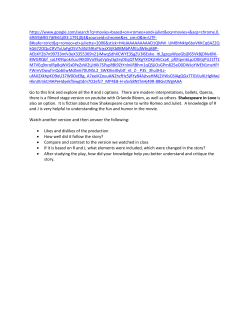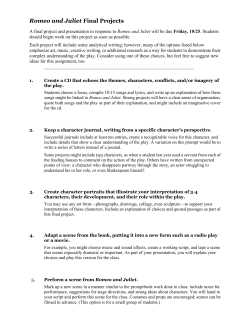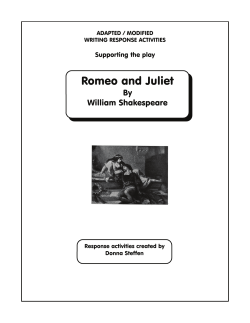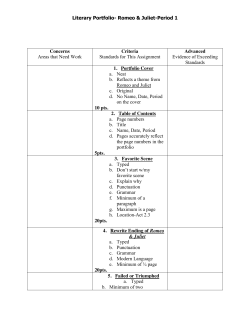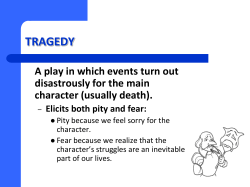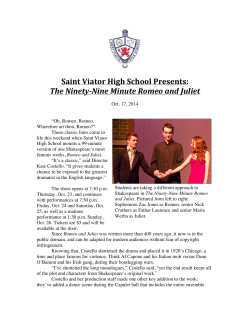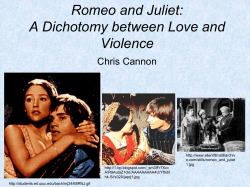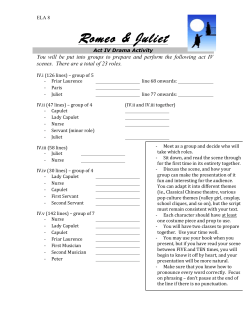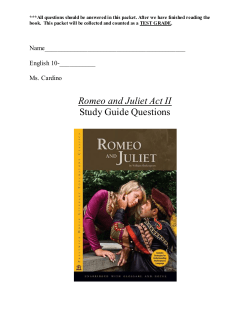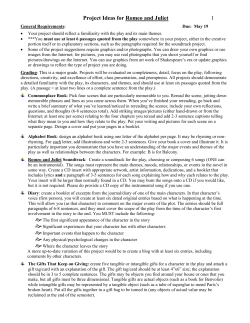
Romeo and Juliet - Test Preparation
Test Preparation Romeo and Juliet by William Shakespeare Your Complete Test Preparation Guide (For Grades 7-12) Multiple Choice Questions, Short Essay & Essay Questions, Mid-Book & Final Test Multiple Choice Questions The Multiple Choice Questions in this Test Preparation Guide will test a student's understanding of Romeo and Juliet. The questions are broken out into sections, so they focus on specific chapters within Romeo and Juliet. This allows you to test and review the book as you proceed through the unit. Short Essay Questions The Short Essay Questions listed in this section require a one to two sentence answer. They ask students to demonstrate a deeper understanding of Romeo and Juliet by describing what they have read, rather than just recalling it. The short essay questions evaluate not only whether students have read the material, but also how well they understand and can apply it. They require more thought than a multiple choice question, but are shorter than the essay questions. Essay Questions Students should have a full understanding of the unit material in order to answer these questions. They often include multiple parts of the work and ask for a thorough analysis of the overall text. These essays are designed to challenge a student's understanding of the broad points in a work, interactions among the characters, and main points and themes of the text. Mid-Book Test (Easy, Medium and Hard) Final Test (Easy, Medium and Hard) Answer Keys ©2014 BookRags, Inc. Multiple Choice 1. How does the word dignity in line 1 of the prologue suggest both houses are alike? (a) In social standing. (b) In relation to Prince Escalus. (c) In violence. (d) In sadness. 2. Where does the play take place? (a) Verona, Italy. (b) Naples, Italy. (c) Rome, Italy. (d) Florence, Italy. 3. The grudge between feuding families is described as _______. (a) Major. (b) Ancient. (c) Minor. (d) Recent. 4. The feud between the Capulets and Montagues has caused ______________. (a) Political exile for both families. (b) Bankruptcy in both families. (c) Violence and death in both families. (d) Social ostracization for both families. 5. Romeo and Juliet are ______________. (a) From feuding families. (b) From different countries. (c) From feuding kingdoms. (d) From different towns. 6. What ultimately ends the feud between the Capulets and Montagues? (a) A final, decisive battle. (b) The prince's exile of both families. (c) A desperate plea from Romeo and Juliet. (d) The deaths of Romeo and Juliet. 1 7. In Act 1, Prologue, the chorus asks the audience to be what? (a) Fair. (b) Patient. (c) Quiet. (d) Participatory. 8. The prologue is supposed to ______________. (a) Reveal the murderers. (b) Tell the ending of the play. (c) Describe the town and the time period. (d) Give a brief overview of the story. 9. Romeo and Juliet's love is described as star-crossed, which means ____________. (a) Planned by God. (b) Lost. (c) Ill-fated. (d) Famous. 10. How long does the prologue predict the play will be? (a) Four hours. (b) Three hours. (c) One hour. (d) Two hours. 11. Civil blood has made civil hands unclean because ____________. (a) All of the town's civilians are killing one another. (b) Members of both families have joined the prince's war. (c) Members of both families have killed one another. (d) The families' actions have made murder an acceptable act. 12. The chorus promises that anything left out of the prologue will be __________. (a) Obvious to the audience. (b) Unimportant. (c) Covered during the events of the play. (d) Made clear in the prologues to other Acts. 13. Who do Sampson and Gregory first encounter in the city square in Act 1, Scene 1? (a) Romeo and Juliet. (b) Abram and Balthasar, of the Montagues. (c) Prince Escalus. (d) Capulet and Montague. 2 14. Who tries to discourage the battle in Act 1, Scene 1? (a) Capulet. (b) Sampson. (c) Gregory. (d) Benvolio. 15. In Act 1, Scene 1, Tybalt accuses Benvolio of what? (a) Treachery. (b) Cowardice. (c) Inciting violence. (d) Disrespect. 16. The Prince reveals that there have already been ____________. (a) Three battles between families. (b) Six battles between families. (c) Four battles between families. (d) Two battles between families. 17. Prince Escalus declares that the next time the families disturb the peace, they will pay ________. (a) For all the damage done. (b) In heavy prison sentences. (c) With their lives. (d) A hefty fine. 18. Who does Montague ask for an account of the brawl in Act 1, Scene 1? (a) Prince Escalus. (b) Tybalt. (c) Romeo. (d) Benvolio. 19. At the beginning of the play, Montague and Lady Montague are concerned about Romeo because _________. (a) He refuses to leave the house. (b) He is in love with Rosaline, of whom they do not approve. (c) He has been part of so many brawls recently. (d) He hides in his room and has been miserable lately. 20. Romeo claims he is in love as the play opens, but is unhappy because ______________. (a) He is already engaged to Juliet. (b) The girl he loves does not love him. (c) His parents oppose the match. (d) He has no intention of getting married. 3 21. The girl Romeo loves "has Dian's wit," which means _______. (a) She is interested in marriage only if it improves her social standing. (b) She is a disciple of the goddess Diana, and will therefore become a nun. (c) She is chaste, and therefore not interested in an affair with Romeo. (d) She is much smarter than Romeo. 22. In lines 186-196, Romeo compares love to all of the following EXCEPT what? (a) A sea nourished with tears. (b) A preserving sweet. (c) A smoke made with the fume of sighs. (d) A clenching pain in the heart. 23. Romeo alludes to Cupid because ____________. (a) Cupid is the god of war. (b) Cupid is the god of heartbreak. (c) Cupid is the god of beauty. (d) Cupid is the god of love. 24. In the play's first scene, Benvolio advises Romeo to _________. (a) Pursue Juliet. (b) Propose to Rosaline. (c) Leave Rosaline. (d) Forget Rosaline. 25. At the beginning of Act 1, Scene 2, Capulet and Paris discuss _________. (a) The upcoming party at Capulet's house. (b) Romeo's discouragement over Rosaline. (c) The Prince's declaration about the feud. (d) The feud between the families. 26. Capulet's initial objection to Paris courting his daughter is due to what? (a) Juliet's age. (b) Juliet's disdain for marriage. (c) Paris' connection to the Montagues. (d) Paris' social position. 27. Capulet allows that his consent is one part of the courtship agreement, but the other part is ___________. (a) The Prince's permission. (b) Juliet's consent. (c) Juliet's dowry. (d) Lady Capulet's permission. 4 165. When Romeo hears the news about Juliet, he plans to do what? (a) Kill himself in front of the Capulets. (b) Kill himself so he can be with her again. (c) Go back to Verona to seek revenge. (d) Beg the friar for poison in order to kill himself. 166. Why does Romeo visit the apothecary in Act 5, Scene 1? (a) He wants to buy a potion to wake Juliet. (b) He wants to buy poison to kill Paris. (c) He wants to buy a potion to fake his own death. (d) He wants to buy poison so he can kill himself and be with Juliet. 167. Why is the apothecary hesitant to sell Romeo poison? (a) He is afraid Romeo will die. (b) He does not have what Romeo needs. (c) It is against his morals. (d) It is against the law. 168. Why does the apothecary finally take Romeo's money? (a) He wants revenge. (b) He is poor. (c) He is corrupt. (d) He wants to kill Romeo. 169. Why has Friar John come to visit Friar Laurence in Act 5, Scene 2? (a) He has come to tell Friar Laurence he could not deliver Romeo's letter. (b) He has come to tell Friar Laurence that Juliet is dead. (c) He has come to tell Friar Laurence to go get Juliet from the vault. (d) He has come to tell Friar Laurence that he is sick. 170. Why was Friar John prevented from delivering Romeo's letter? (a) He was quarantined due to an infectious illness in the town. (b) He did not trust Romeo with the letter. (c) He was told Romeo was ill and could not have visitors. (d) He was afraid to visit a town with an infectious pestilence. 171. Who gave the letter to Romeo explaining about Juliet? (a) Friar Laurence delivered the letter. (b) No one was able to deliver the letter. (c) Benvolio delivered the letter. (d) Balthasar delivered the letter. 25 172. Friar Laurence tells Friar John that ____________. (a) Refusing to deliver the letter has caused many deaths. (b) Neglecting the letter would get him in trouble. (c) Neglecting the letter could cause danger. (d) Refusing to deliver the letter was a crime. 173. Friar Laurence plans to remedy the situation by doing what? (a) Giving Father John another letter to take to Romeo. (b) Writing again to Mantua after he rescues Juliet. (c) Telling Juliet the truth. (d) Leaving for Mantua to get Romeo. 174. Friar Laurence heads to the burial monument in Act 5, Scene 2 because _____________. (a) Romeo has not answered his letters. (b) Romeo has promised to meet him there. (c) Juliet will wake in three hours alone. (d) Juliet has promised to meet him there. 175. Before he can enter the tomb, Romeo encounters who? (a) Friar Laurence. (b) Paris. (c) Balthasar. (d) Capulet. 176. When Romeo sees Juliet in Act 5, Scene 3, he is struck by _______________. (a) How beautiful she is, even in death. (b) How cold she is. (c) How brave she is to lay among the dead. (d) How beautiful she is compared to the other corpses. 177. Friar Laurence arrives in Act 5, Scene 3 _______________. (a) After Romeo and Juliet kill themselves. (b) After Romeo dies, but before Juliet kills herself. (c) Before Romeo dies, but after Juliet kills herself. (d) Before Romeo and Juliet die. 178. Because Juliet finds Romeo dead, she _____________. (a) Runs from the vault. (b) Marries Paris. (c) Begs the friar for an explanation. (d) Stabs herself with his dagger. 26 179. What proof does the Prince find for the events that took place? (a) The Prince reads Romeo's letters to Friar Laurence. (b) The Prince asks Paris' page to tell the truth. (c) The Prince asks Balthasar to tell the truth. (d) The Prince reads Friar Laurence's letter to Romeo. 180. What peace has arrived in Verona at the end of the play? (a) Peace between the Montagues and Capulets. (b) Peace between Mercutio and Tybalt. (c) Peace for the dead. (d) The Prince finally has peace on his streets. 27 Multiple Choice Key 1. A 2. A 3. B 4. C 5. A 6. D 7. B 8. D 9. C 10. D 11. C 12. C 13. B 14. D 15. B 16. A 17. C 18. D 19. D 20. B 41. A 42. D 43. D 44. A 45. C 46. A 47. C 48. D 49. A 50. C 51. A 52. C 53. A 54. A 55. A 56. A 57. B 58. A 59. B 60. B 81. A 82. D 83. D 84. A 85. D 86. A 87. B 88. C 89. B 90. C 91. B 92. B 93. A 94. B 95. D 96. C 97. B 98. D 99. B 100. A 121. A 122. C 123. D 124. D 125. C 126. C 127. D 128. D 129. A 130. A 131. A 132. A 133. C 134. B 135. B 136. C 137. C 138. B 139. D 140. D 21. C 22. D 23. D 24. D 25. D 26. A 27. B 28. C 29. B 30. C 31. B 32. B 33. A 34. C 35. C 36. B 37. C 38. D 39. D 40. B 61. B 62. A 63. C 64. B 65. A 66. B 67. D 68. D 69. A 70. D 71. A 72. B 73. C 74. B 75. A 76. C 77. B 78. C 79. A 80. A 101. B 102. C 103. A 104. C 105. B 106. D 107. A 108. B 109. D 110. B 111. B 112. A 113. B 114. C 115. B 116. B 117. A 118. A 119. C 120. B 141. A 142. A 143. D 144. B 145. C 146. C 147. C 148. A 149. D 150. C 151. C 152. C 153. C 154. A 155. B 156. A 157. D 158. D 159. B 160. B 28 161. A 162. D 163. C 164. B 165. B 166. D 167. D 168. B 169. A 170. A 171. B 172. C 173. B 174. C 175. B 176. A 177. B 178. D 179. D 180. A Short Answer Questions 1. How does the word dignity in line 1 of the prologue suggest both houses are alike? 2. Where does the play take place? 3. The grudge between feuding families is described as _______. 4. The feud between the Capulets and Montagues has caused ______________. 5. Romeo and Juliet are ______________. 6. What ultimately ends the feud between the Capulets and Montagues? 7. In Act 1, Prologue, the chorus asks the audience to be what? 29 8. The prologue is supposed to ______________. 9. Romeo and Juliet's love is described as star-crossed, which means ____________. 10. How long does the prologue predict the play will be? 11. Civil blood has made civil hands unclean because ____________. 12. The chorus promises that anything left out of the prologue will be __________. 13. Who do Sampson and Gregory first encounter in the city square in Act 1, Scene 1? 14. Who tries to discourage the battle in Act 1, Scene 1? 30 15. In Act 1, Scene 1, Tybalt accuses Benvolio of what? 16. The Prince reveals that there have already been ____________. 17. Prince Escalus declares that the next time the families disturb the peace, they will pay ________. 18. Who does Montague ask for an account of the brawl in Act 1, Scene 1? 19. At the beginning of the play, Montague and Lady Montague are concerned about Romeo because _________. 20. Romeo claims he is in love as the play opens, but is unhappy because ______________. 21. The girl Romeo loves "has Dian's wit," which means _______. 31 169. Why has Friar John come to visit Friar Laurence in Act 5, Scene 2? 170. Why was Friar John prevented from delivering Romeo's letter? 171. Who gave the letter to Romeo explaining about Juliet? 172. Friar Laurence tells Friar John that ____________. 173. Friar Laurence plans to remedy the situation by doing what? 174. Friar Laurence heads to the burial monument in Act 5, Scene 2 because _____________. 175. Before he can enter the tomb, Romeo encounters who? 53 176. When Romeo sees Juliet in Act 5, Scene 3, he is struck by _______________. 177. Friar Laurence arrives in Act 5, Scene 3 _______________. 178. Because Juliet finds Romeo dead, she _____________. 179. What proof does the Prince find for the events that took place? 180. What peace has arrived in Verona at the end of the play? 54 Short Answer Questions Key 1. How does the word dignity in line 1 of the prologue suggest both houses are alike? In social standing. 2. Where does the play take place? Verona, Italy. 3. The grudge between feuding families is described as _______. Ancient. 4. The feud between the Capulets and Montagues has caused ______________. Violence and death in both families. 5. Romeo and Juliet are ______________. From feuding families. 6. What ultimately ends the feud between the Capulets and Montagues? The deaths of Romeo and Juliet. 7. In Act 1, Prologue, the chorus asks the audience to be what? Patient. 55 8. The prologue is supposed to ______________. Give a brief overview of the story. 9. Romeo and Juliet's love is described as star-crossed, which means ____________. Ill-fated. 10. How long does the prologue predict the play will be? Two hours. 11. Civil blood has made civil hands unclean because ____________. Members of both families have killed one another. 12. The chorus promises that anything left out of the prologue will be __________. Covered during the events of the play. 13. Who do Sampson and Gregory first encounter in the city square in Act 1, Scene 1? Abram and Balthasar, of the Montagues. 14. Who tries to discourage the battle in Act 1, Scene 1? Benvolio. 56 15. In Act 1, Scene 1, Tybalt accuses Benvolio of what? Cowardice. 16. The Prince reveals that there have already been ____________. Three battles between families. 17. Prince Escalus declares that the next time the families disturb the peace, they will pay ________. With their lives. 18. Who does Montague ask for an account of the brawl in Act 1, Scene 1? Benvolio. 19. At the beginning of the play, Montague and Lady Montague are concerned about Romeo because _________. He hides in his room and has been miserable lately. 20. Romeo claims he is in love as the play opens, but is unhappy because ______________. The girl he loves does not love him. 21. The girl Romeo loves "has Dian's wit," which means _______. She is chaste, and therefore not interested in an affair with Romeo. 57 22. In lines 186-196, Romeo compares love to all of the following EXCEPT what? A clenching pain in the heart. 23. Romeo alludes to Cupid because ____________. Cupid is the god of love. 24. In the play's first scene, Benvolio advises Romeo to _________. Forget Rosaline. 25. At the beginning of Act 1, Scene 2, Capulet and Paris discuss _________. The feud between the families. 26. Capulet's initial objection to Paris courting his daughter is due to what? Juliet's age. 27. Capulet allows that his consent is one part of the courtship agreement, but the other part is ___________. Juliet's consent. 28. When will Paris will get his first chance to woo Juliet? At Capulet's party that evening. 58 162. Why do the musicians refuse to play at the end of Act 4, Scene 5? Because Juliet is dead and the familiy is mourning. 163. Ironically, in Act 5, Scene 1, Romeo's dreams have hinted at _____________. Joyful news. 164. What news does Balthasar give Romeo at the beginning of Act 5? Juliet is dead. 165. When Romeo hears the news about Juliet, he plans to do what? Kill himself so he can be with her again. 166. Why does Romeo visit the apothecary in Act 5, Scene 1? He wants to buy poison so he can kill himself and be with Juliet. 167. Why is the apothecary hesitant to sell Romeo poison? It is against the law. 168. Why does the apothecary finally take Romeo's money? He is poor. 78 169. Why has Friar John come to visit Friar Laurence in Act 5, Scene 2? He has come to tell Friar Laurence he could not deliver Romeo's letter. 170. Why was Friar John prevented from delivering Romeo's letter? He was quarantined due to an infectious illness in the town. 171. Who gave the letter to Romeo explaining about Juliet? No one was able to deliver the letter. 172. Friar Laurence tells Friar John that ____________. Neglecting the letter could cause danger. 173. Friar Laurence plans to remedy the situation by doing what? Writing again to Mantua after he rescues Juliet. 174. Friar Laurence heads to the burial monument in Act 5, Scene 2 because _____________. Juliet will wake in three hours alone. 175. Before he can enter the tomb, Romeo encounters who? Paris. 79 176. When Romeo sees Juliet in Act 5, Scene 3, he is struck by _______________. How beautiful she is, even in death. 177. Friar Laurence arrives in Act 5, Scene 3 _______________. After Romeo dies, but before Juliet kills herself. 178. Because Juliet finds Romeo dead, she _____________. Stabs herself with his dagger. 179. What proof does the Prince find for the events that took place? The Prince reads Friar Laurence's letter to Romeo. 180. What peace has arrived in Verona at the end of the play? Peace between the Montagues and Capulets. 80 Short Essay Questions 1. Why is the play called "The Tragedy of Romeo and Juliet"? 2. What is the cause of the current feud between the two families, according to the Act 1 prologue? 3. What, according to the Act 1 prologue, will comprise the traffic of the stage? 4. How are Romeo and Juliet's families alike, and why might this be important? 5. What are Sampson and Gregory saying about the Montagues as they approach the city square? 6. What gesture does Sampson make toward Abram? 7. What is Benvolio trying to do as the fight breaks out in the square? 81 8. Why is Prince Escalus angry with the Montagues and Capulets? 9. How does Capulet respond to Paris' proposal to court Juliet? 10. How do Romeo and Benvolio find themselves invited to a party at the Capulet's? 11. What freedom does Capulet seem to be offering Juliet in her choices for marriage? 12. Why does Benvolio attempt to convince Romeo to pursue other loves? 13. How does Lady Capulet appear to feel about Paris as a prospective groom for her daughter? 14. What story does the nurse tell about Juliet in Act 1, Scene 3? 82 50. What does Juliet plan to do if the potion does not work? 51. Why is Capulet so happy in Act 4, Scene 4? 52. Why are the preparations for Juliet's wedding to Paris so rushed? 53. What consolation does the friar offer the Capulet family when Juliet is found dead? 54. What are Capulet's final instructions for the wedding day? 55. Why does Romeo believe he can get the apothecary to sell him poison, though it is illegal? 56. In what way has Romeo sold the apothecary "poison"? 88 57. Why does Friar Laurence ask for an "iron crow" when he learns that Romeo did not get his letter? 58. What is Friar Laurence's plan for Juliet now that the letter has failed to reach Romeo? 59. Why does Paris try to prevent Romeo from entering the vault? 60. Why does the Friar leave Juliet alone in the vault at the end of the play? 89 Short Essay Questions Key 1. Why is the play called "The Tragedy of Romeo and Juliet"? The play is called a tragedy because, as the prologue explains, the title characters will kill themselves before the end of the play. Their feuding families caused their deaths, and only their deaths could end the feud between the families. 2. What is the cause of the current feud between the two families, according to the Act 1 prologue? The prologue does not specify a cause for the feud, only referring to it as an ancient grudge. The word ancient implies that the feud may be so old no one remembers the cause. However, the old grudge has broken out into new fights recently. 3. What, according to the Act 1 prologue, will comprise the traffic of the stage? The story of Romeo and Juliet's love, their difficulties in pursuing it, and the ongoing battle between their parents will be the main events of the play. 4. How are Romeo and Juliet's families alike, and why might this be important? The prologue claims that the families are alike in social status, and that implies that the only factor reasonably keeping them apart is the feud between their two families. The ongoing feud continues to cause new conflict for Romeo and Juliet, who might otherwise run in the same circles. 5. What are Sampson and Gregory saying about the Montagues as they approach the city square? Sampson and Gregory claim they will kill the male Montagues, and behead or rape the females. The feud is so prevalent now that Sampson and Gregory are waiting for a fight as they enter the square. 90 6. What gesture does Sampson make toward Abram? Sampson bites his thumb at Abram, an offensive gesture that is designed to provoke a fight with the approaching Montagues. 7. What is Benvolio trying to do as the fight breaks out in the square? Benvolio attempts to keep peace between the two parties as the fight breaks out. He fails because Tybalt arrives and challenges him. 8. Why is Prince Escalus angry with the Montagues and Capulets? Prince Escalus is angry because the two families have disturbed the peace of Verona three times for trivial reasons. People have been wounded and died because of the hate between the two families. The prince knows that Montague and Capulet can choose to end the feud, but are too proud and stubborn to do so. 9. How does Capulet respond to Paris' proposal to court Juliet? Capulet is reluctant at first because of Juliet's youth and believes young brides are "too soon marred." Capulet also claims that Juliet is his last hope for happiness. He does relent to Paris' courtship, however, when he invites Paris to a party later that evening. 10. How do Romeo and Benvolio find themselves invited to a party at the Capulet's? Romeo and Benvolio happen upon the illiterate servant Capulet has sent out to invite his guests to the party. Since they are able to read the servant's list of guests, they learn the details of the party and decide to attend. 11. What freedom does Capulet seem to be offering Juliet in her choices for marriage? Capulet implies that he can only give his permission for Juliet to marry; he will not force 91 her to love someone she does not love. Therefore he advises Paris to win Juliet's heart, as that appears to be the only way to guarantee the match. 12. Why does Benvolio attempt to convince Romeo to pursue other loves? Benvolio believes that a new romance would "cure" Romeo of his unhappiness by distracting him. Benvolio is looking for ways to cheer Romeo up and pull him out of his melancholy state. 13. How does Lady Capulet appear to feel about Paris as a prospective groom for her daughter? Lady Capulet appears to feel Juliet is old enough for marriage, and describes Paris as "valiant." She also makes several other favorable comparisons and appears to feel that Paris is a good match for Juliet. 14. What story does the nurse tell about Juliet in Act 1, Scene 3? The nurse tells a story about Juliet falling down as a child. The nurse's husband comforted her and told her she would be smart enough to fall on her back rather than her face when she got older. 15. How does the nurse respond to Lady Capulet's questions about marriage? The nurse responds positively to the mentions of both marriage and Paris himself. She encourages Juliet to find happiness in marriage with Paris. She is also nostalgic about Juliet growing up, as she has raised Juliet since she was a baby. 16. What is the difference between Lady Capulet's behavior toward Juliet and the nurse's behavior? Lady Capulet appears to present her questions in a matter-of-fact manner, while the nurse gushes and reminisces about Juliet's growing up. While Lady Capulet is practical, the nurse is emotional. 92 17. How does Benvolio respond to Romeo's concerns about attending the Capulet's party? Benvolio seems to be unconcerned about negative consequences of attending the party, including getting caught. However, he does express concern that they will be late for the party. 18. What is the general meaning of Mercutio's speech about Queen Mab? Mercutio distracts and entertains Romeo with the story of Queen Mab, who influences one's dreams and causes general mischief. His story implies that Queen Mab has caused Romeo's present heartbreak, and that Romeo should not be overcome by it. 19. How does Juliet respond to Romeo's advances when they meet at the party? Juliet seems open to Romeo's advances and engages in a conversation with him. She also allows him to kiss her twice, indicating she is interested in his attentions toward her. 20. Why does Capulet discourage Tybalt from confronting Romeo? Capulet says he does not want to disturb his guests at the party, and says that Romeo is behaving like a gentleman at the party. Capulet is also offended by Tybalt's disrespectful behavior and eventually sends Tybalt away angrily. 21. How is Romeo's love for Juliet different from his love for Rosaline, according to the Act 2 prologue? Romeo's love for Juliet is "matched," where his love for Rosaline was never returned. The new affection for Juliet replaces the appeal of Romeo's desire for Rosaline. 22. What limitations do Romeo and Juliet face as lovers? According to the Act 2 prologue, Romeo and Juliet will not have as many opportunities to meet and speak the vows that other lovers may speak freely. Romeo is also not free 93 50. What does Juliet plan to do if the potion does not work? Juliet is so afraid that the potion will not work that she keeps a dagger at her side in order to kill herself, rather than be married to Paris. 51. Why is Capulet so happy in Act 4, Scene 4? Capulet is relieved that Juliet has come around to the marriage, and he is excited about the preparations for it. He even jokes with his wife about his roving eye because he is excited about he day's events. 52. Why are the preparations for Juliet's wedding to Paris so rushed? The preparations for the wedding are rushed because Capulet has planned the wedding on such short notice. His rush to end their grieving over Tybalt and settle the question of Juliet's marriage has caused him to act hastily, and has created a need for urgency in the household. 53. What consolation does the friar offer the Capulet family when Juliet is found dead? The Friar tells Juliet's family that she is in Heaven and, therefore, safe from any further harm. He also suggests that she can not be more "advanced" than to go on to Heaven before her parents, rather than finding social advancement through a prominent marriage. 54. What are Capulet's final instructions for the wedding day? Capulet instructs the servants to change all the celebratory preparations to mourning preparations, changing the hymns to dirges, and the wedding feast to a burial feast. 99 55. Why does Romeo believe he can get the apothecary to sell him poison, though it is illegal? The apothecary is so poor that Romeo believes he will sell anything out of desperation. He knows that enough money will overcome the apothecary's concerns. 56. In what way has Romeo sold the apothecary "poison"? Romeo believes that money has corrupted the world, and that, in giving the apothecary money, he has contributed to his corruption. 57. Why does Friar Laurence ask for an "iron crow" when he learns that Romeo did not get his letter? Friar Laurence knows he will have to go rescue Juliet from the vault since Romeo is not coming. He will need an iron crow bar to wrench the burial vault open. 58. What is Friar Laurence's plan for Juliet now that the letter has failed to reach Romeo? Friar Laurence will rescue Juliet from the vault and bring her back to his cell until he can reach Romeo by letter. 59. Why does Paris try to prevent Romeo from entering the vault? Paris believes Romeo is there to desecrate the burial vault because he is a Montague, and Paris will defend it. 60. Why does the Friar leave Juliet alone in the vault at the end of the play? The Friar is afraid to stay in the vault because he hears people approaching outside, and he does not want to be caught inside the vault. He is afraid his deeds will be revealed. 100 Essay Topic 7 The Tragedy of Romeo and Juliet is set in Verona, Italy. Consider this setting as the background for the events of the play, and write an essay in which you argue for or against Verona, Italy, as a catalyst for events of the play. Be sure to use evidence from the text to support your argument. Essay Topic 8 Consider the figures available as guides for Romeo and Juliet, such as the nurse, the friar, Capulet, Montague, and the prince. Write an essay in which you identify any character as the most reliable and responsible guide for Romeo and Juliet. Be sure to use evidence from the text to support your answer. Essay Topic 9 Consider the cause and effect relationships between events in Romeo and Juliet, such as Tybalt's stabbing of Mercutio, which results in Romeo killing Tybalt. Write an essay in which you choose the three most significant cause and effect relationships in the play, and explain their significance to events and themes. Essay Topic 10 Romeo and Juliet are often idealized as the ultimate romantic young couple. After reading the play, write an essay in which you defend, refute, or qualify the notion that Romeo and Juliet are the ultimate teenage couple. Be sure to use evidence from the text to support your claim. Essay Topic 11 In an essay, compare Romeo and Juliet to another couple in literature, either tragic or otherwise. What makes Romeo and Juliet extraordinary or typical as a romantic couple in literature? Use evidence from the text to support your argument. Essay Topic 12 Robert F. Kennedy said, "Tragedy is a tool for the living to gain wisdom, not a guide by which to live." Considering this quote, explain how The Tragedy of Romeo and Juliet teaches its readers wisdom. Identify the events that qualify Romeo and Juliet as a tragedy according to Kennedy's definition. 102 One Week Quiz A Name: _________________________ Period: ___________________ This quiz consists of 5 multiple choice and 5 short answer questions through Act 4, Scene 2. Multiple Choice Questions 1. According to the Prologue of Act 2, what lends the couple power? (a) Support from friends. (b) Time. (c) Passion. (d) Love. 2. After Act 4, Scene 2, Juliet asks the nurse to do what? (a) Help her choose what she will wear to the wedding. (b) Help her take the potion and hide the evidence. (c) Pretend to go along with the wedding. (d) Leave her alone to make her own decisions. 3. in Act 2, Scene 6, the friar prays that the heavens will do what? (a) Smile upon Romeo and Juliet's marriage. (b) Prepare Romeo and Juliet for hardship. (c) Conceal the marriage from Juliet's parents. (d) Prevent the marriage if it is not meant to be. 4. The friar compares too-passionate love to what? (a) Fire and gunpowder. (b) Fire and water. (c) Swords and guns. (d) Gunpowder and bullets. 5. Juliet considers herself wealthy in Act 2, Scene 6 because __________. (a) She has true love. (b) She will have a large inheritance. (c) Romeo's family is wealthy. (d) Her father is wealthy. 105 Short Answer Questions 1. The prologue of Act 2 reveals that despite difficulty, __________________. 2. Romeo dares death to ________________. 3. What young affection does the prologue of Act 2 refer to? 4. What advice does the friar give Romeo about love at the start of Act 2, Scene 6? 5. Juliet claims she met Paris at the friar's cell and ____________. 106 Multiple Choice Questions Key 1. C 2. A 3. A 4. A 5. A Short Answer Questions Key 1. The prologue of Act 2 reveals that despite difficulty, __________________. The lovers will still have a chance to meet and be together. 2. Romeo dares death to ________________. Do what he dare if Romeo is allowed to marry Juliet. 3. What young affection does the prologue of Act 2 refer to? Romeo and Juliet's new love for each other. 4. What advice does the friar give Romeo about love at the start of Act 2, Scene 6? Love moderately. 5. Juliet claims she met Paris at the friar's cell and ____________. Encouraged him modestly. 107 Mid-Book Test - Hard Name: _________________________ Period: ___________________ This test consists of 5 short answer questions, 10 short essay questions, and 1 (of 3) essay topics. Short Answer Questions 1. After reviewing the Capulet servant's list, Benvolio discovers that _________________. 2. At the beginning of the play, Montague and Lady Montague are concerned about Romeo because _________. 3. In Act 1, Scene 4, Romeo describes love as ________. 4. Capulet's initial objection to Paris courting his daughter is due to what? 5. Romeo and Juliet are ______________. 158 Short Essay Questions 1. How do Juliet's verbalized fears in Act 4, Scene 3 foreshadow upcoming events? 2. Why does Benvolio attempt to convince Romeo to pursue other loves? 3. What is the general meaning of Mercutio's speech about Queen Mab? 4. Why does the nurse prolong Juliet's anxiety in Act 2, Scene 5? 5. How will the potion free Juliet from the commitment to marry Paris? 6. How does Capulet respond to Paris' proposal to court Juliet? 7. Why does Paris try to prevent Romeo from entering the vault? 159 8. Why does Mercutio fight Tybalt instead of Romeo? 9. Why are Benvolio and Mercutio teasing Romeo in Act 2, Scene 1? 10. What is the difference between Lady Capulet's behavior toward Juliet and the nurse's behavior? 160 Essay Topics Essay Topic 1 Consider the contrasting motifs of light and dark, or blindness and sight in Romeo and Juliet. Write an essay in which you explore the symbolic meanings of any two contrasting motifs in the play, discussing its contribution to the play's theme or themes. Essay Topic 2 Consider Benvolio's role as peacemaker in the play. Write an essay in which you argue for Benvolio's effectiveness as a character. Consider whether or not he is effective as peacemaker, and what purpose he might serve in the play. Essay Topic 3 Consider the female characters in Romeo and Juliet, and their roles in the events of the play. Write an essay in which you discuss any female character's significance to the events of the text. 161 Short Answer Key 1. After reviewing the Capulet servant's list, Benvolio discovers that _________________. Rosaline will be attending the Capulet's party. 2. At the beginning of the play, Montague and Lady Montague are concerned about Romeo because _________. He hides in his room and has been miserable lately. 3. In Act 1, Scene 4, Romeo describes love as ________. Too rough. 4. Capulet's initial objection to Paris courting his daughter is due to what? Juliet's age. 5. Romeo and Juliet are ______________. From feuding families. Short Essay Answer Key 1. How do Juliet's verbalized fears in Act 4, Scene 3 foreshadow upcoming events? In Act 4, Scene 3, Juliet voices her fears that the potion will harm, rather than save her. It does harm her, though not as poison does. She fears the poison will cause her death, and, indirectly, it does, because she kills herself as a result of Romeo's suicide over her 162 "death." She also envisions waking in the burial vault to be surrounded by the dead, and that event occurs as well. 2. Why does Benvolio attempt to convince Romeo to pursue other loves? Benvolio believes that a new romance would "cure" Romeo of his unhappiness by distracting him. Benvolio is looking for ways to cheer Romeo up and pull him out of his melancholy state. 3. What is the general meaning of Mercutio's speech about Queen Mab? Mercutio distracts and entertains Romeo with the story of Queen Mab, who influences one's dreams and causes general mischief. His story implies that Queen Mab has caused Romeo's present heartbreak, and that Romeo should not be overcome by it. 4. Why does the nurse prolong Juliet's anxiety in Act 2, Scene 5? The nurse jokes and teases Juliet because her character always turns to humor when asked for a straight answer. She teases Juliet because she knows Juliet is anxious to hear of Romeo's reply. 5. How will the potion free Juliet from the commitment to marry Paris? The potion will cause Juliet to appear dead for forty-two hours, allowing her to escape to the burial vault, where Romeo and the friar will meet her and take her to Mantua. 6. How does Capulet respond to Paris' proposal to court Juliet? Capulet is reluctant at first because of Juliet's youth and believes young brides are "too soon marred." Capulet also claims that Juliet is his last hope for happiness. He does relent to Paris' courtship, however, when he invites Paris to a party later that evening. 163 7. Why does Paris try to prevent Romeo from entering the vault? Paris believes Romeo is there to desecrate the burial vault because he is a Montague, and Paris will defend it. 8. Why does Mercutio fight Tybalt instead of Romeo? Mercutio is disgusted by Romeo's "submission" to Tybalt, and he will no longer bear Tybalt's insults. He fights Tybalt to defend Romeo's honor. 9. Why are Benvolio and Mercutio teasing Romeo in Act 2, Scene 1? Benvolio and Mercutio tease Romeo because they believe he is simply pouting over his love for Rosaline. They believe he is hiding from them so he can be alone with his thoughts, and, as his friends, they are used to this kind of behavior from him. 10. What is the difference between Lady Capulet's behavior toward Juliet and the nurse's behavior? Lady Capulet appears to present her questions in a matter-of-fact manner, while the nurse gushes and reminisces about Juliet's growing up. While Lady Capulet is practical, the nurse is emotional. 164
© Copyright 2025
